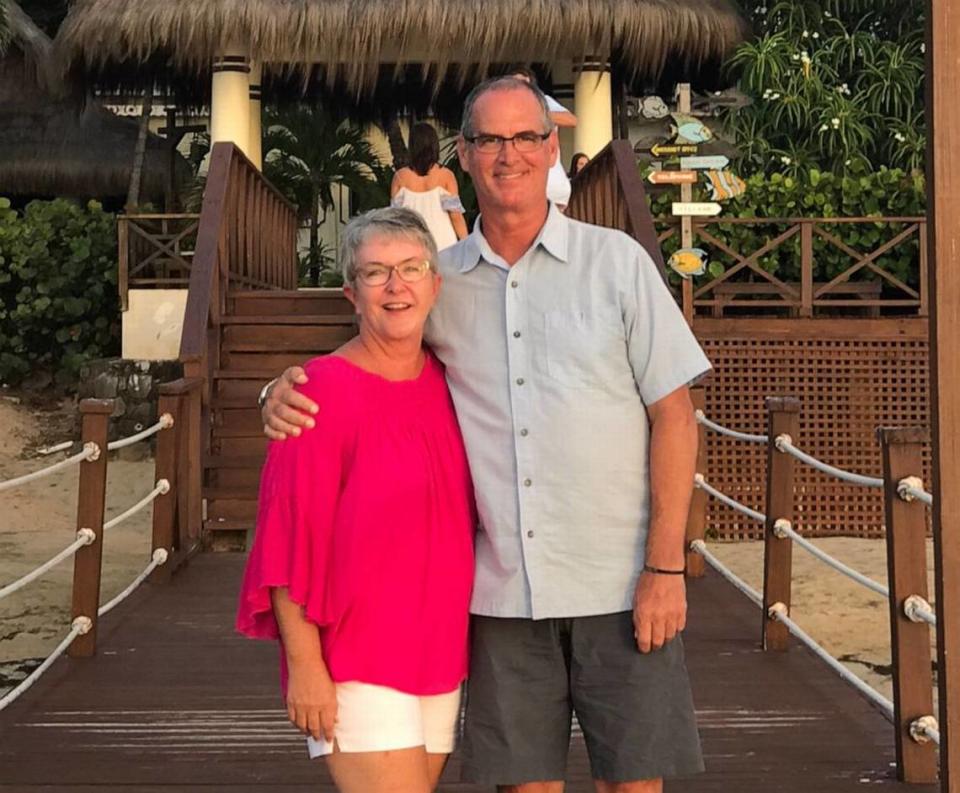DeSantis approves plan allowing nursing home visits, but will facilities go along?
Gov. Ron DeSantis on Tuesday green-lighted Florida nursing homes and assisted-living facilities to start allowing residents to have socially distanced visits from loved ones.
The governor’s executive order, effective immediately, will end the five-month ban on visitors at long-term care facilities that he imposed in an effort to protect the state’s most vulnerable residents from the coronavirus. The order will continue to allow visits from those deemed essential or compassionate caregivers, including in facilities that have had recent positive tests.
Under the new rule, long-term care homes that haven’t had a new COVID case in 14 days may start scheduling visitors for residents and provide designated spaces, indoors and out, for them to greet the residents.
“Many of the folks understand that they have loved ones who are in the last stage of their life ... They just would like to be able to say goodbye or to hug somebody,’’ DeSantis said at a roundtable with regulators.
The recommendations made by the Task Force on the Safe and Limited Re-Opening of Long-Term Care Facilities stipulate that visitors must be 18 or older, wear masks and maintain social distancing. The facilities must demonstrate adequate staffing, enough cleaning supplies and personal protective equipment for staff and residents, and demonstrate that local hospitals have capacity if COVID-19 cases spike.
The governor’s order will be optional and not required.

Mary Daniel, a Jacksonville woman who became a dishwasher at her husband’s memory-care center just so she could see him, said the decision is not without risk, and families know that. The governor appointed her to the task force after she started a national Facebook group, Caregivers for Compromise, seeking a more accommodating visitation plan.
“We are going to see some cases. I know that,’’ Daniel said at the roundtable. “But I also know that I want to be with my husband. And everybody else out there — hundreds of thousands of caregivers — want to be with their families and to be with them to be able to hold their hands at the end of their life.”
How many will allow visits?
It’s unclear how many of the state’s 3,771 facilities will allow visitors right away, but Mary Mayhew, secretary for the state Agency for Health Care Administration, said she thinks about 60% of the facilities will be eligible immediately.
Of the 154,000 individuals residing in long-term care facilities, 3,400 are positive for COVID-19, Mayhew said, down from a peak over the summer of nearly 10,000.
“Today’s announcement by the governor is a significant step forward in achieving our shared goal of reuniting long-term care residents with their loved ones,” the Florida Health Care Association wrote in a prepared statement.
The decision, while welcomed by families and elder-care advocates, is not without criticism.
“If the guidance issued today is safe now, why wasn’t it safe in May or June?” wrote Jeff Johnson, Florida director of AARP on Twitter.
As the governor and president tout the recent federal requirement that long-term care facilities test staff weekly, using rapid testing machines supplied by the federal government, Johnson asked why the same machines could not be used for visitors.
“If it’s important enough to require for staff, why would visitors be different? Visitation is critically important,” he said. “We owe it to all involved to do it safely.”
One facility plans cautious approach
John Perkins is executive director of Tessera of Brandon, a 146-bed assisted-living facility. His facility is planning a cautious approach, he said.
“There’s a lot of push right now ... to open up the community as soon as possible to have visitation,” he said. “I think everybody I know, our concern is, how do we manage that to where it doesn’t put our residents and staff at risk?”
Tessera’s first step will be to test residents, Perkins said. Once all residents are deemed negative for the coronavirus, the facility will reinstate communal dining and activities, and then potentially open for visitation. The facility has had six cases among residents, with no new cases since July 23, Perkins said.
The task force did not discuss an enforcement plan.
Both Mayhew and state Surgeon General Scott Rivkees said they do not want facilities to require visitors to provide proof of a negative coronavirus test. DeSantis reiterated that at Tuesday’s roundtable, saying that testing is not always accurate.
“If it’s a false positive, you’re denying people access to their loved ones,” he said, “and if it’s a false negative you’re giving them a false sense of security.”
The governor called Florida’s visitation plan a ’thoughtful approach” that could be an example for other states.
“I think it is a small risk against the certain harm of prolonged isolation or the certain harms of not allowing people to be with their loved ones,’’ he said.
Mary Ellen Klas can be reached at meklas@miamiherald.com and @MaryEllenKlas

